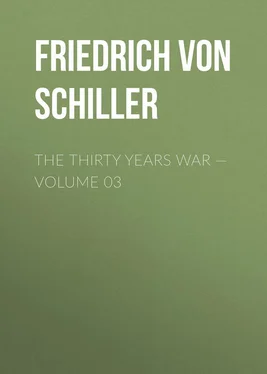Friedrich Schiller - The Thirty Years War — Volume 03
Здесь есть возможность читать онлайн «Friedrich Schiller - The Thirty Years War — Volume 03» — ознакомительный отрывок электронной книги совершенно бесплатно, а после прочтения отрывка купить полную версию. В некоторых случаях можно слушать аудио, скачать через торрент в формате fb2 и присутствует краткое содержание. Жанр: История, literature_18, foreign_antique, foreign_prose, на английском языке. Описание произведения, (предисловие) а так же отзывы посетителей доступны на портале библиотеки ЛибКат.
- Название:The Thirty Years War — Volume 03
- Автор:
- Жанр:
- Год:неизвестен
- ISBN:нет данных
- Рейтинг книги:5 / 5. Голосов: 1
-
Избранное:Добавить в избранное
- Отзывы:
-
Ваша оценка:
- 100
- 1
- 2
- 3
- 4
- 5
The Thirty Years War — Volume 03: краткое содержание, описание и аннотация
Предлагаем к чтению аннотацию, описание, краткое содержание или предисловие (зависит от того, что написал сам автор книги «The Thirty Years War — Volume 03»). Если вы не нашли необходимую информацию о книге — напишите в комментариях, мы постараемся отыскать её.
The Thirty Years War — Volume 03 — читать онлайн ознакомительный отрывок
Ниже представлен текст книги, разбитый по страницам. Система сохранения места последней прочитанной страницы, позволяет с удобством читать онлайн бесплатно книгу «The Thirty Years War — Volume 03», без необходимости каждый раз заново искать на чём Вы остановились. Поставьте закладку, и сможете в любой момент перейти на страницу, на которой закончили чтение.
Интервал:
Закладка:
While Gustavus Adolphus was extending his conquests in the south, his generals and allies were gaining similar triumphs in the other provinces. Lower Saxony shook off the yoke of Austria, the enemy abandoned Mecklenburg, and the imperial garrisons retired from the banks of the Weser and the Elbe. In Westphalia and the Upper Rhine, William, Landgrave of Hesse, rendered himself formidable; the Duke of Weimar in Thuringia, and the French in the Electorate of Treves; while to the eastward the whole kingdom of Bohemia was conquered by the Saxons. The Turks were preparing to attack Hungary, and in the heart of Austria a dangerous insurrection was threatened. In vain did the Emperor look around to the courts of Europe for support; in vain did he summon the Spaniards to his assistance, for the bravery of the Flemings afforded them ample employment beyond the Rhine; in vain did he call upon the Roman court and the whole church to come to his rescue. The offended Pope sported, in pompous processions and idle anathemas, with the embarrassments of Ferdinand, and instead of the desired subsidy he was shown the devastation of Mantua.
On all sides of his extensive monarchy hostile arms surrounded him. With the states of the League, now overrun by the enemy, those ramparts were thrown down, behind which Austria had so long defended herself, and the embers of war were now smouldering upon her unguarded frontiers. His most zealous allies were disarmed; Maximilian of Bavaria, his firmest support, was scarce able to defend himself. His armies, weakened by desertion and repeated defeat, and dispirited by continued misfortunes had unlearnt, under beaten generals, that warlike impetuosity which, as it is the consequence, so it is the guarantee of success. The danger was extreme, and extraordinary means alone could raise the imperial power from the degradation into which it was fallen.
The most urgent want was that of a general; and the only one from whom he could hope for the revival of his former splendour, had been removed from his command by an envious cabal. So low had the Emperor now fallen, that he was forced to make the most humiliating proposals to his injured subject and servant, and meanly to press upon the imperious Duke of Friedland the acceptance of the powers which no less meanly had been taken from him. A new spirit began from this moment to animate the expiring body of Austria; and a sudden change in the aspect of affairs bespoke the firm hand which guided them. To the absolute King of Sweden, a general equally absolute was now opposed; and one victorious hero was confronted with another. Both armies were again to engage in the doubtful struggle; and the prize of victory, already almost secured in the hands of Gustavus Adolphus, was to be the object of another and a severer trial. The storm of war gathered around Nuremberg; before its walls the hostile armies encamped; gazing on each other with dread and respect, longing for, and yet shrinking from, the moment that was to close them together in the shock of battle. The eyes of Europe turned to the scene in curiosity and alarm, while Nuremberg, in dismay, expected soon to lend its name to a more decisive battle than that of Leipzig. Suddenly the clouds broke, and the storm rolled away from Franconia, to burst upon the plains of Saxony. Near Lutzen fell the thunder that had menaced Nuremberg; the victory, half lost, was purchased by the death of the king. Fortune, which had never forsaken him in his lifetime, favoured the King of Sweden even in his death, with the rare privilege of falling in the fulness of his glory and an untarnished fame. By a timely death, his protecting genius rescued him from the inevitable fate of man — that of forgetting moderation in the intoxication of success, and justice in the plenitude of power. It may be doubted whether, had he lived longer, he would still have deserved the tears which Germany shed over his grave, or maintained his title to the admiration with which posterity regards him, as the first and only JUST conqueror that the world has produced. The untimely fall of their great leader seemed to threaten the ruin of his party; but to the Power which rules the world, no loss of a single man is irreparable. As the helm of war dropped from the hand of the falling hero, it was seized by two great statesmen, Oxenstiern and Richelieu. Destiny still pursued its relentless course, and for full sixteen years longer the flames of war blazed over the ashes of the long-forgotten king and soldier.
I may now be permitted to take a cursory retrospect of Gustavus Adolphus in his victorious career; glance at the scene in which he alone was the great actor; and then, when Austria becomes reduced to extremity by the successes of the Swedes, and by a series of disasters is driven to the most humiliating and desperate expedients, to return to the history of the Emperor.
As soon as the plan of operations had been concerted at Halle, between the King of Sweden and the Elector of Saxony; as soon as the alliance had been concluded with the neighbouring princes of Weimar and Anhalt, and preparations made for the recovery of the bishopric of Magdeburg, the king began his march into the empire. He had here no despicable foe to contend with. Within the empire, the Emperor was still powerful; throughout Franconia, Swabia, and the Palatinate, imperial garrisons were posted, with whom the possession of every place of importance must be disputed sword in hand. On the Rhine he was opposed by the Spaniards, who had overrun the territory of the banished Elector Palatine, seized all its strong places, and would everywhere dispute with him the passage over that river. On his rear was Tilly, who was fast recruiting his force, and would soon be joined by the auxiliaries from Lorraine. Every Papist presented an inveterate foe, while his connexion with France did not leave him at liberty to act with freedom against the Roman Catholics. Gustavus had foreseen all these obstacles, but at the same time the means by which they were to be overcome. The strength of the Imperialists was broken and divided among different garrisons, while he would bring against them one by one his whole united force. If he was to be opposed by the fanaticism of the Roman Catholics, and the awe in which the lesser states regarded the Emperor's power, he might depend on the active support of the Protestants, and their hatred to Austrian oppression. The ravages of the Imperialist and Spanish troops also powerfully aided him in these quarters; where the ill-treated husbandman and citizen sighed alike for a deliverer, and where the mere change of yoke seemed to promise a relief. Emissaries were despatched to gain over to the Swedish side the principal free cities, particularly Nuremberg and Frankfort. The first that lay in the king's march, and which he could not leave unoccupied in his rear, was Erfurt. Here the Protestant party among the citizens opened to him, without a blow, the gates of the town and the citadel. From the inhabitants of this, as of every important place which afterwards submitted, he exacted an oath of allegiance, while he secured its possession by a sufficient garrison. To his ally, Duke William of Weimar, he intrusted the command of an army to be raised in Thuringia. He also left his queen in Erfurt, and promised to increase its privileges. The Swedish army now crossed the Thuringian forest in two columns, by Gotha and Arnstadt, and having delivered, in its march, the county of Henneberg from the Imperialists, formed a junction on the third day near Koenigshofen, on the frontiers of Franconia.
Francis, Bishop of Wurtzburg, the bitter enemy of the Protestants, and the most zealous member of the League, was the first to feel the indignation of Gustavus Adolphus. A few threats gained for the Swedes possession of his fortress of Koenigshofen, and with it the key of the whole province. At the news of this rapid conquest, dismay seized all the Roman Catholic towns of the circle. The Bishops of Wurtzburg and Bamberg trembled in their castles; they already saw their sees tottering, their churches profaned, and their religion degraded. The malice of his enemies had circulated the most frightful representations of the persecuting spirit and the mode of warfare pursued by the Swedish king and his soldiers, which neither the repeated assurances of the king, nor the most splendid examples of humanity and toleration, ever entirely effaced. Many feared to suffer at the hands of another what in similar circumstances they were conscious of inflicting themselves. Many of the richest Roman Catholics hastened to secure by flight their property, their religion, and their persons, from the sanguinary fanaticism of the Swedes. The bishop himself set the example. In the midst of the alarm, which his bigoted zeal had caused, he abandoned his dominions, and fled to Paris, to excite, if possible, the French ministry against the common enemy of religion.
Читать дальшеИнтервал:
Закладка:
Похожие книги на «The Thirty Years War — Volume 03»
Представляем Вашему вниманию похожие книги на «The Thirty Years War — Volume 03» списком для выбора. Мы отобрали схожую по названию и смыслу литературу в надежде предоставить читателям больше вариантов отыскать новые, интересные, ещё непрочитанные произведения.
Обсуждение, отзывы о книге «The Thirty Years War — Volume 03» и просто собственные мнения читателей. Оставьте ваши комментарии, напишите, что Вы думаете о произведении, его смысле или главных героях. Укажите что конкретно понравилось, а что нет, и почему Вы так считаете.











